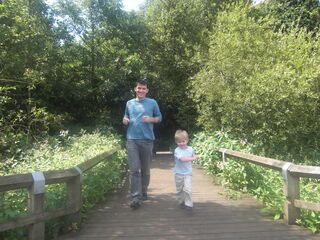Child Development
Why a Harmonious Childhood Is Key to Psychological and Social Health
The child is father of the man.
Posted April 30, 2024 Reviewed by Abigail Fagan
Key points
- There is a strong link between childhood trauma and both psychopathic traits and substance abuse.
- Societies with healthy child-raising practices have the highest level of wellbeing.
- If a society wishes to improve levels of wellbeing and harmony, the best place to start is childhood.

Of all the factors that determine psychological health and personality, one of the most powerful is our childhood experiences. As I showed in my last post, there is a clear link between psychopathic tendencies and early life trauma and emotional deprivation. In almost all cases, serial killers and brutal dictators suffered appalling deprivation and abuse during childhood.
Research has also showed a clear link between childhood trauma and substance abuse. Studies of adult drug users have shown a very high level of sexual and physical abuse. For example, one study found that 70% of male and 56% of female drug users had been sexually abused as children.1 Another study of 470 women and men patients at a detoxification facility found that 81% of men and 69% of men had suffered physical or sexual abuse during childhood.2
This correlation also holds on a collective social level. Societies with the harshest, least affectionate brutal child-raising practices also tend to have lower levels of social harmony. At first sight this might not seem to make sense. Don’t all human beings, no matter which society they belong, love their children, and raise them affectionately?
On a certain level this is true, but there are great variations in child-raising practices around the world. While 83% of Western European countries have banned all physical punishment of children, this is true of only 11% of North African or Arabic countries, and only 6% of Asian countries.3 One study found that incidences of serious physical violence to children were lowest in Denmark4, while another study from 32 countries found that only 15% of Swedish students agreed that children sometimes need “a good harsh spanking,” compared with 90% in South Korea and Singapore.5
There is another correlation between levels of physical punishment and the attitude of fathers to their children. In countries with high levels of physical punishment, it is usually less acceptable for fathers to openly show affection to their children, or to be closely involved in their upbringing. The role of the father is more likely to be that of an authority figure, or disciplinarian, while day-to-day childcare is largely left to the mother. In contrast, Scandinavian countries have the most gender equal parenting in the world. In Finland, fathers spend more time with school age children than mothers.6
There are many factors that contribute to a nation’s general level of well-being, but it is surely significant that Scandinavian countries are consistently ranked as the world’s happiest countries. One reason why these countries have a higher level of wellbeing is because of low levels of childhood trauma and emotional deprivation.
Historical Attitudes to Children
In my book, The Fall, I showed that harsh child-raising practices also correlate with higher levels of hierarchy, patriarchy, warfare and sexual repression. In pre-modern Europe and Asia, the physical abuse of children was common – and even seen as essential, as a way of teaching a child discipline, so that children might learn to control their naturally “sinful” and selfish nature. As the historian L. DeMause wrote, “A very large percentage of the children born prior to the 18th century were what would today be termed battered children.”7
In ancient Rome, children were regularly beaten by parents and teachers, who used a special torture instrument made from the hard and sharp stalks of fennel plants. The early Christian church advised parents to regularly whip their children, and even made a special punishment day, Holy Innocents’ Day, when children would be whipped to remind them of the massacre by Herod. Even more horrifically, this is a passage from a popular seventeenth-century Russian etiquette manual:
"Punish your son in his early years and he will comfort you in your old age and be the ornament of your soul. Do not spare your child any beating, for the stick will not kill him, but will do him good; when you strike the body, you save the soul from death…Raise your child in fear and you will find peace and blessing in him."8
Not surprisingly, such societies were brutal in other ways – warlike, hierarchical and severely patriarchal. We can presume that, in such societies, almost all children suffered trauma and emotional deprivation. As a result, many of them grew up to be adults who were aggressive and violent, and lacking empathy and emotion.
An Improving Situation
In these terms, the way to create both psychologically healthy human beings, and harmonious human societies, is simple: to improve child-raising practices, to raise children with as much affection and attention as possible, so that they don’t suffer trauma or emotional deprivation. If every child was raised in such a way, there would be far fewer people with psychopathic traits, and far fewer people with substance abuse issues. On a more general level, societies would be more egalitarian and peaceful.
Of course, this is an impossible dream. It is very difficult to regulate child-raising practices. You might argue that there will always be a certain proportion of parents whose personality and social situation means that they are unable to raise their children attentively and affectionately.
However, there are measures that societies can take to improve the situation. Parents can be offered education and support. This is one of the important features of Scandinavian countries. Since the 1930s, all Finnish parents are given a maternity package – known as a “baby box” – which now contains 64 items, including clothes, bed linen, care products and books. The Finnish government also provides free universal daycare for babies from eight months. In Sweden, parents are entitled to 16 months parental leave, a generous monthly child allowance, while parents with prams or pushchairs travel free on buses.
Obviously, such measures are expensive. However, the high level of wellbeing in such countries more than justifies the expense. If any society seriously wishes to improve levels of wellbeing and overall harmony, the best place to start is childhood.
References
1. Schäfer M, Schnack B, Soyka M. Sexueller und körperlicher Missbrauch während früher Kindheit oder Adoleszenz bei späterer Drogenabhängigkeit [Sexual and physical abuse during early childhood or adolescence and later drug addiction]. Psychother Psychosom Med Psychol. 2000 Feb;50(2):38-50. German. doi: 10.1055/s-2000-13235. PMID: 10721277. https://pubmed.ncbi.nlm.nih.gov/10721277/
2. Liebschutz J, Savetsky JB, Saitz R, Horton NJ, Lloyd-Travaglini C, Samet JH. The relationship between sexual and physical abuse and substance abuse consequences. J Subst Abuse Treat. 2002 Apr;22(3):121-8. doi: 10.1016/s0740-5472(02)00220-9. PMID: 12039614; PMCID: PMC4861063. https://www.ncbi.nlm.nih.gov/pmc/articles/PMC4861063/
3. Global Initiative to End All Corporal Punishment of Children (2020). Global progress towards prohibiting all corporal punishment. Retrieved January 30, 2020, from https://endcorporalpunishment.org.
4. Pinquart, M. Cultural Differences in the Association of Harsh Parenting with Internalizing and Externalizing Symptoms: A Meta-Analysis. J Child Fam Stud 30, 2938–2951 (2021). https://doi.org/10.1007/s10826-021-02113-zhttps://link.springer.com/article/10.1007/s10826-021-02113-z#ref-CR41
5. Straus, M. (2010). Prevalence, societal causes, and trends in corporal punishment by parents in world perspective. Law and Contemporary Problems, 73(2), 1–30 https://link.springer.com/article/10.1007/s10826-021-02113-z
6. 'Gender Equality' - https://www.oecd.org/gender/the-pursuit-of-gender-equality-978926428131…
7. DeMause, L. (1974). “The Evolution of Childhood.” In DeMause, L. (Ed.), The History of Childhood. Psychohistory Press.
8. DeMeo, J. (1998). Saharasia. The 4000 BCE Origins of Child Abuse, Sex-Repression,Warfare and Social Violence in the Deserts of the OldWorld. OBRL.




